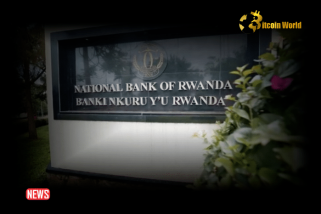
Rwanda Central Bank Embarks on Innovative Retail CBDC Project
ルワンダ中央銀行が革新的な小売CBDCプロジェクトに着手
The National Bank of Rwanda (BNR) has unveiled its comprehensive feasibility study on a retail central bank digital currency (CBDC), now open for public feedback.
ルワンダ国立銀行(BNR)は、小売中央銀行デジタル通貨(CBDC)に関する包括的な実現可能性調査を発表し、現在一般からのフィードバックを受け付けている。
BNR envisions a national digital currency tailored to Rwanda's unique conditions, leveraging technological advancements and addressing local challenges. A retail CBDC would accelerate the country's cashless economy initiative and bolster the resilience of its financial system, which faces intermittent power outages.
BNR は、技術の進歩を活用し、地域の課題に対処しながら、ルワンダの独特の状況に合わせた国家デジタル通貨を構想しています。小売CBDCは国のキャッシュレス経済構想を加速し、断続的な停電に直面する金融システムの回復力を強化するだろう。
Despite its cashless aspirations, the central bank estimates spending $35 million on printing and maintaining its cash supply over the next five years.
キャッシュレス化を目指しているにもかかわらず、中銀は印刷と現金供給の維持に今後5年間で3,500万ドルを支出すると見積もっている。
BNR proposes an interest-free, intermediated CBDC that seamlessly integrates with existing payment systems and potentially other CBDCs, subject to amendments to the Central Bank Act. The recommended model is token-based, enabling offline transfers via Bluetooth or Near Field Communication (NFC) without requiring smartphones. This contrasts with current electronic payment options.
BNRは、中央銀行法の改正を条件として、既存の決済システムおよび潜在的に他のCBDCとシームレスに統合する無利子の仲介型CBDCを提案しています。推奨モデルはトークンベースであり、スマートフォンを必要とせずに Bluetooth または近距離無線通信 (NFC) を介したオフライン転送が可能です。これは、現在の電子決済オプションとは対照的です。
Open programmability and smart contracts offer potential benefits, but the study acknowledges the trade-off with privacy and security. The BNR anticipates "partial pseudo-anonymity" for the CBDC.
オープン プログラマビリティとスマート コントラクトには潜在的な利点がありますが、調査ではプライバシーとセキュリティとのトレードオフが認められています。 BNR は CBDC に「部分的な擬似匿名性」を期待しています。
Payment service providers currently account for less than 0.9% of Rwanda's financial sector, facing challenges such as low financial literacy, high remittance costs, and a significant informal economy. The BNR believes reducing cash in circulation could formalize more of the economy.
現在、決済サービスプロバイダーがルワンダの金融セクターに占める割合は0.9%未満であり、金融リテラシーの低さ、送金コストの高さ、深刻な非公式経済などの課題に直面している。 BNRは、流通する現金を減らすことで、経済がさらに形式化される可能性があると考えている。
The study recommends user fees and holding limits, but details are yet to be defined. Public acceptance of the CBDC remains an open question.
この研究ではユーザー手数料と保有制限を推奨しているが、詳細はまだ定められていない。 CBDC が一般に受け入れられるかどうかは、依然として未解決の問題です。
BNR favors a distributed database model for reliability, utilizing the World Economic Forum's CBDC Policy-Maker Toolkit for analysis.
BNR は信頼性を高めるために分散データベース モデルを好み、分析には世界経済フォーラムの CBDC Policy-Maker Toolkit を利用します。
Tokenized wholesale CBDC projects have been explored by Mastercard, Ripple, the European Central Bank, and the Bank for International Settlements' Project Agora. Tokenization in a retail CBDC may represent a novel innovation.
トークン化されたホールセールCBDCプロジェクトは、マスターカード、リップル、欧州中央銀行、国際決済銀行のプロジェクト・アゴラによって検討されてきました。小売り CBDC におけるトークン化は、新たなイノベーションとなる可能性があります。
Offline CBDC transfers are also an active research area. China's digital yuan incorporates solutions similar to those proposed by the BNR.
オフラインの CBDC 送金も活発な研究分野です。中国のデジタル人民元には、BNRが提案したものと同様のソリューションが組み込まれている。
Disclaimer: The information provided is not trading advice. Bitcoinworld.co.in holds no liability for any investments made based on the information provided on this page. We strongly recommend independent research and/or consultation with a qualified professional before making any investment decisions.
免責事項: 提供される情報は取引に関するアドバイスではありません。 Bitcoinworld.co.in は、このページで提供される情報に基づいて行われた投資に対して一切の責任を負いません。投資を決定する前に、独立した調査や資格のある専門家への相談を強くお勧めします。
Binance #WRITE2EARN
バイナンス #WRITE2EARN


 DogeHome
DogeHome BlockchainReporter
BlockchainReporter CoinPedia News
CoinPedia News TheNewsCrypto
TheNewsCrypto CFN
CFN Optimisus
Optimisus Crypto News Land
Crypto News Land






















